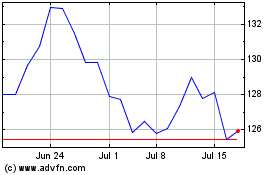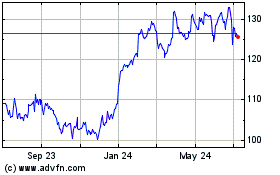Pharma Companies Split on Coronavirus Vaccine Pricing Plans
July 21 2020 - 6:09PM
Dow Jones News
By Jared S. Hopkins and Peter Loftus
Pharmaceutical companies are split on how they would price their
potential Covid-19 vaccines, with some pledging to members of
Congress Tuesday that they wouldn't seek a profit from the shots
while others indicated that they would.
During a hearing of the U.S. House Energy and Commerce Oversight
and Investigations Subcommittee, conducted by remote video,
officials from companies such as AstraZeneca PLC and Pfizer Inc.
that have some of the most advanced vaccine candidates in
development, expressed differences in how prices would be set for
their vaccines if they are proven safe and approved for use, but
they didn't offer pricing details.
Officials from AstraZeneca and Johnson & Johnson said they
would sell their vaccines at the cost of production, at least until
the novel coronavirus pandemic subsides. Moderna Inc. and Merck
& Co. executives said they would set prices exceeding their
manufacturing costs.
An executive from Pfizer, which has said it expects to make a
profit from a successful Covid-19 vaccine, suggested the company
wouldn't charge too much for the vaccine it is developing with
partner BioNTech SE, saying the price would reflect the
"extraordinary times" of the pandemic.
As the most advanced vaccine candidates enter final stages of
testing this month, their cost has emerged as an increasingly
important and sensitive issue for manufacturers of the shots,
governments and private insurers expected to pick up the tab, and
investors.
Pricing of the vaccines could fuel long-running criticism by
doctors, patients and lawmakers of pharmaceutical industry pricing
practices, or blunt it.
"Ensuring the safety and efficacy of Covid-19 vaccines is
critical, but it will mean nothing if the price is a barrier to all
Americans getting it," Rep. Jan Schakowsky (D., Ill.) said during
the hearing.
Ms. Schakowksy said several of the companies have received
federal funding for coronavirus vaccine projects.
Pharmaceutical companies haven't said what they plan to charge,
but analysts say drugmakers could earn billions of dollars.
The private-sector cost for flu shots ranges from about $16 to
$25 per dose, according to the Centers for Disease Control and
Prevention. Covid-19 vaccines could cost between $50 and $100 per
course in the U.S. and Europe, Jefferies & Co. analyst Michael
Yee estimated in a recent research note. Moderna, he said, could
ring up $2 billion in sales from its vaccine in its first year.
On Monday, researchers from the University of Oxford and partner
AstraZeneca as well as Pfizer reported data from early-stage
studies showing that their vaccines generated immune responses and
were safe.
Moderna recently reported positive results from an early study
of its vaccine, which is scheduled to begin final-stage testing
this month.
At Tuesday's hearing, Moderna President Stephen Hoge said the
company wouldn't sell its vaccine at cost. He said the federal
funding Moderna has received is supporting research and
development, and Moderna hasn't signed a supply contract with the
government.
Julie Gerberding, Merck's chief patient officer, said its
coronavirus vaccine wouldn't be available until next year at the
earliest. She said the company hasn't determined what the price
would be, but Merck wouldn't sell it at cost.
U.K.-based AstraZeneca would price the 300 million doses it
pledged in an agreement with the U.S. government on a
not-for-profit basis, said Dr. Mene Pangalos, executive vice
president, BioPharmaceuticals R&D.
Macaya Douoguih, head of clinical development and medical
affairs at J&J's vaccine unit, said the company would sell the
vaccine at a not-for-profit price during the pandemic emergency.
The company's vaccine is slated to begin human testing this
month.
Pfizer Chief Business Officer John Young said individuals
shouldn't have to pay anything toward the cost of a vaccination,
but he didn't say how much the company plans to charge governments
or insurers for its shot.
"We'll price our potential vaccine consistent with the urgent
global health emergency that we're facing," Mr. Young said. He said
Pfizer plans to apply for an emergency use authorization in October
if its vaccine is proven to be safe and effective.
Write to Jared S. Hopkins at jared.hopkins@wsj.com and Peter
Loftus at peter.loftus@wsj.com
(END) Dow Jones Newswires
July 21, 2020 17:54 ET (21:54 GMT)
Copyright (c) 2020 Dow Jones & Company, Inc.
Merck (NYSE:MRK)
Historical Stock Chart
From Mar 2024 to Apr 2024

Merck (NYSE:MRK)
Historical Stock Chart
From Apr 2023 to Apr 2024
